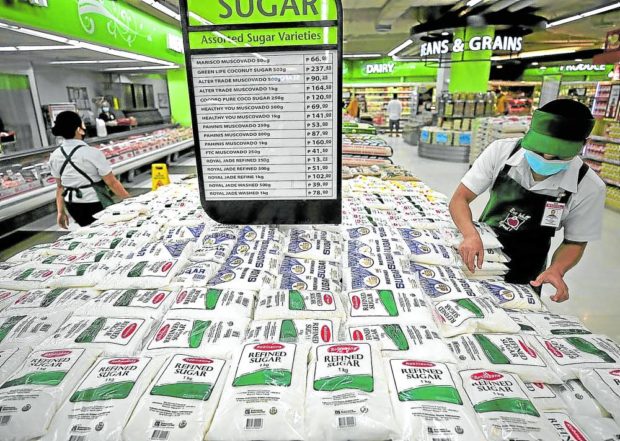
A grocery worker arranges sugar packs around a price reference board. —INQUIRER FILE PHOTO
BACOLOD CITY — Two planters federations joined the call for a lesser volume of sugar importation than the 450,000 metric tons (MT) proposed by the Sugar Regulatory Administration (SRA) for a two-month buffer stock.
In a joint letter submitted on Jan. 30 to the SRA, the National Federation of Sugarcane Planters (NFSP) headed by Enrique Rojas and the Panay Federation of Sugarcane Farmers (PanayFed) led by Danilo Abelita appealed for the importation of only 350,000 MT of sugar to arrive in two tranches after the close of the current milling season and before the opening of the coming milling season in September 2023.
The stand of NFSP and PanayFed was reached in collaboration with the Confederation of Sugar Producers Association (Confed), spearheaded by Aurelio Gerardo Valderrama Jr..
Confed submitted its stand to SRA on Friday, calling for a more conservative volume of importation to arrive in two shipments of 175,000 MT each in July and August.
Representing majority of sugar producers in the country, Confed, NFSP and PanayFed recently organized a sugar producers coalition called the Sugar Council, which serves as venue where sugar producers and other concerned stakeholders discuss issues and craft recommendations for submission to policy-makers that advance, promote, and secure the continued viability of the sugar industry.
The three federations requested SRA to provide actual and projected sugar production and demand figures to justify the request by softdrink companies to import sugar.
When SRA announced that the country needed to import 450,000 MT of sugar as a two-month buffer stock, the federations again discussed the proposal through the Sugar Council. They arrived at a more conservative figure for the proposed importation.
They recommended that the importation should be about 350,000 MT to cover the two-month buffer stock to arrive after the close of the current milling season but before the start of the coming milling season to minimize its effect on millgate prices when regular milling begins in September 2023.
They also urged the SRA to program the importation in two tranches of 175,000 MT for each shipment to arrive in July and August after almost all sugar mills had stopped operations.
“SRA should specify what volume of the importation will be refined and raw sugar based on assessment of market requirements, what portion will go to the domestic market, and what will be earmarked for industrial and institutional consumers with safeguards to ensure that the sugar goes to the intended markets,” the sugar producers said.
In February 2022, the SRA authorized the importation of 200,000 MT of refined sugar for use by the beverage industry.
It decided on the importation as both wholesale and retail prices of raw and refined sugar reached record highs after Typhoon “Odette” (international name: Rai) in December 2021.
The SRA planned to import another 300,000 MT of refined sugar in mid-2022, but President Marcos disallowed it.
In September, the SRA issued another directive authorizing the importation of 150,000 MT of refined sugar at the request of various stakeholders.
As of Jan. 13, the average retail price of refined sugar was P100.72 per kilogram (kg) in supermarkets and P97.50 in wet markets in Metro Manila, according to SRA data.
Last year’s data showed that the average retail price per kg of refined sugar in supermarkets and groceries in Metro Manila rose from P95.02 in September to P99.70 in October, P101.85 in November and P101.45 in December, up from the average range of P54.55 to P55.68 for the same period in 2021.
Raw sugar production reached 928,257 MT as of Jan. 15, a 17.56-percent increase from 789,628 MT a year ago, and 21.33 percent higher than the 765,021 MT produced as of Jan. 17, 2021.
RELATED STORIES
Labor groups slam planned importation of 450,000 MT sugar
Explain huge sugar importation, industry leaders tell gov’t